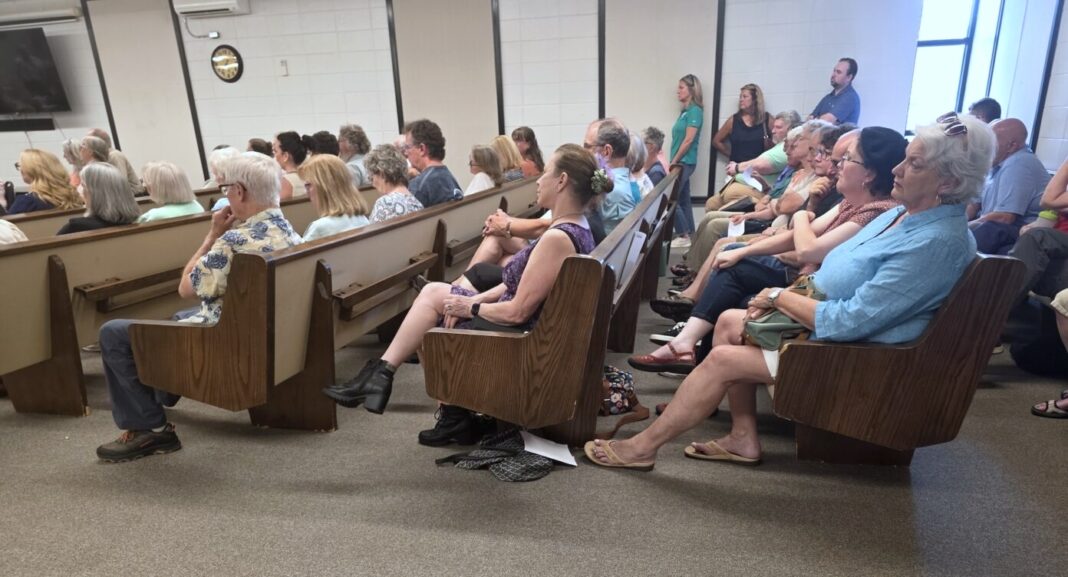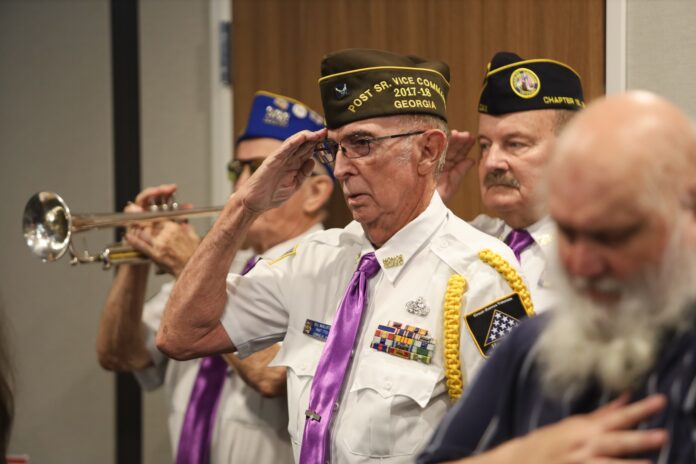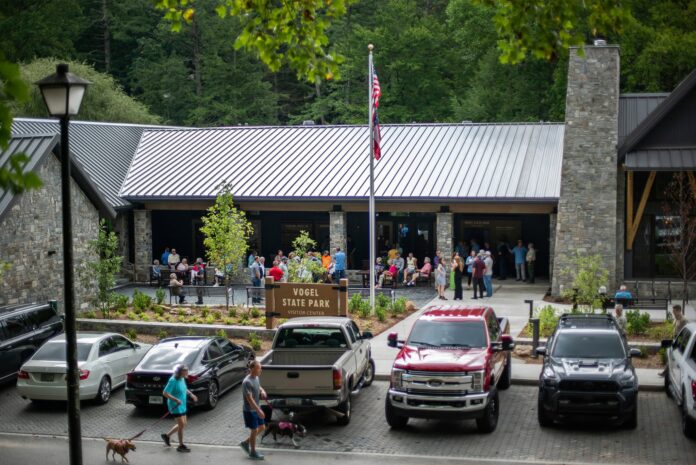Clayton, Georgia. Residents rallied to defend Highroads Tasting Room on Monday night, and the Clayton City Council chambers were packed to capacity. If the city does not reevaluate restrictions in an ordinance that restricts tasting facilities to offering only Georgia wines by the glass, the popular local meeting place fears it may have to close.
Although the city updated the code in 2019, many people, including legal experts, are confused and divided about how it applies to Highroads.
The ordinance is being reviewed by us. Councilwoman Sarah Gillespie informed the audience that we would not be changing the decision today. That does not preclude changes to the ordinance. The way it was worded clearly contains some unclear terminology. You elected us to fulfill our duties and clarify things because of this. Please be patient with us, she begged, since we have been working on that for weeks.
Gillespie reassured participants that council members are working toward a resolution and underlined her support for the local business community.
Council punts without attorney
Despite those guarantees, audience members became irate at the council’s refusal to discuss the ordinance with them, and politeness gave way to tension. Council members explained that they were unable to discuss specifics during the 4 p.m. work session because City Attorney Mitchell L. Baker, Jr. was not present.
The main issue is that we are not allowed to discuss it with outside counsel if we disagree with how we interpret our ordinances. According to Clayton Mayor Pro Tem Stacey Fountain, we need him here to guide us in that.
Fountain was questioned by Jabe Hilson, proprietor of Be Effervescent Winery and Highroads Tasting Room,
He’s where?
Fountain said, “He’s on his way back from Atlanta.”
Hilson resisted, Doesn’t that help everyone present today? We won’t have the chance to do that [talk about the ordinance] for another month. The conversation was essentially stopped when Fountain replied, “Jabe, thank you.”
Comment rules spark frustration
As audience members voiced confusion over municipal council procedures, the proceedings became more tense. Anger at the unclear directions grew as none in the crowd appeared to understand the guidelines for public remark. The fact that everyone else had only one minute to express their opinions and only those who had registered beforehand had five minutes to do so infuriated many.
Although many in the audience still hoped to use the remaining time to voice their concerns, the council decided to adjourn early about 45 minutes into the hour-long work session. However, Clayton City Manager Trudy Crunkelton took advantage of the occasion to speak to the irate audience before they adjourned.
According to the lawyer, it’s okay if everyone shares their ideas and the reason they’re here. I think we all know what those thoughts are. On the other hand, we disagree. According to her, if we don’t believe we are interpreting it right, it becomes a legal issue.
“And, back there shaking your head, I’m telling you, our attorney says that [That] is why we are not saying more,” Crunkelton said, turning to face a specific audience member. Crunkelton was prompted to speak louder and accentuate her words with claps when several of you got up and said, “You’re reading it incorrectly.” You’re reading it incorrectly.
City manager, Hilson spar
The city manager then turned to Hilson, mentioning that they had a private meeting in her office.Trudy Crunkelton, the city manager of Clayton (Carly McCurry/NowHabersham.com)
She said, “Jabe, you and I sat in my office and we agreed how we interpreted it [the ordinance].”
Disagreeing with her description, Hilson cut in, saying, “Actually, I decided it was not prudent to argue.”
The audience cheered, and Crunkelton responded scathingly.
You can all cheer for him, and I would like to clarify that although I have been called out and blamed for this, that was not the topic of our talk while we were there in that room. You never stated, “I disagree with your interpretation,” even though there was no disagreement. That was not my interpretation, just so everyone in this room is aware. Before sending Hilson an email informing him that the tasting room was not in compliance, I went to our lawyer and asked him, “Am I understanding this correctly?”
Work session ends early
Council members verified that the city attorney will attend their 5 p.m. council meeting right after the work session when asked if he would be available to debate the ordinance in person.
The council ended the work session early by taking a 15-minute break. Some audience members were offended and still wanted to discuss the city’s tasting room law. Disgruntled, they addressed council members personally during the break. Others divided into smaller groups and talked about the overtly disrespectful and antagonistic behaviors they believed certain local officials demonstrated.People divide into smaller groups and talk about the meeting and the ordinance during the fifteen-minute break. (Habersham/Carly McCurry)
Calls for fairness, clarity
Hilson asked the council to think about issuing a temporary variance after he explained how the problem had impacted his company when the meeting resumed. He requested that until a formal decision could be made, Highroads be permitted to carry on as it has been, providing a large selection of Georgia, domestic, and worldwide wines. Attorney Baker, who had by then traveled from Atlanta, responded that the city had not threatened to revoke the company’s license or issued any penalties for infractions.At a City of Clayton council meeting, councilwomen Althea Bleckley and Amanda Harrold pay close attention while taking notes. (Habersham/Carly McCurry)
And you don’t have to answer this, but from what I hear, there were actions taking place here that were flagrantly against our alcohol statutes and had nothing to do with pouring wines from outside Georgia. Baker continued pointedly. Other problems. which prompted the email exchange [Crunkelton’s].
A number of people in the crowd asked for details about the claim, including what it is. Amanda Harrold, a councilwoman, replied, “This is a communication with us.” Thank you.
“You can respond to that if you want to,” Baker remarked, referring to Hilson once more. or if you’d prefer not to. I don’t necessarily mean that we have to do it. However, just so everyone is aware, the acts that sparked the conversation had nothing to do with the reason we are here today. Jabe, you came and said, “If that is going to be the interpretation, then I would like you to consider changing the ordinance,” after this conversation and statement of the city’s understanding of the ordinance.
Attorney hints at violations
Baker supposedly forced the topic into the discussion to explain why no variance would probably be granted, even though he admitted that the issues he cryptically brought up had little to do with the ordinance debate.
Baker made reference to the unstated claimed violation when he implied that the city did not want Highroads to resume operations as usual. He reiterated that the company has not been subject to any action from the authorities.
The City of Clayton will receive my endorsement. He stated that he thought the council agreed with him on a policy level and that he supported unambiguous ordinances that reflected the values and views of Clayton residents.
Councilwoman Gillespie reiterated her desire to collaborate with Hilson in order to reach a consensus.
Protest moves outside
Several audience members spoke fervently in support of Highroads when they were given another opportunity to speak at the platform. Many people, including artists, lawyers, educators, and businesspeople, characterized the tasting room as an essential component of Clayton’s cultural and civic life.
One man grew visibly emotional as he recalled visiting Highroads with his late father. Another speaker described it as a secret chamber of commerce that helped small businesses, artists, and entrepreneurs connect and thrive.
The Mayor Pro Tem gave people a chance to voice their opposition. Nobody stepped forward.
In one of the night s most dramatic moments, retired attorney Kimberly Lacey sought to present a brief constitutional law perspective on the ordinance. Fountain denied her request to speak during the public comment section and called for security to intervene when she protested his decision, even though the hearing once again ended before the time allotted on the agenda.
As the city s police chief moved in to remove Lacey from the room, she announced to the audience she would deliver her argument on the courthouse lawn. Many in the crowd followed her outside.
Gillespie offers apology and assurance
After the city council meeting adjourned, supporters gathered at Highroads in downtown Clayton to decompress. Gillespie, who had repeatedly emphasized that neither she nor the council sought to drive a small business out of business, stopped by Highroads and spoke with those assembled.
When someone remarked on the rudeness they perceived in the courtroom, she offered an apology on behalf of those responsible, acknowledging and seeking to ease the grievance.
Councilwoman Gillespie reaffirmed her commitment to the community and assured those present that she, too, desired a positive resolution.
As tensions eased in the informal setting, many expressed gratitude for the chance to voice their concerns directly. The evening closed on a note of cautious optimism, with Councilwoman Gillespie s reassurances leaving some hopeful that a collaborative solution might still be reached.
For supporters of Highroads, the evening underscored the importance of community dialogue and the shared desire to preserve local businesses and civic harmony.












